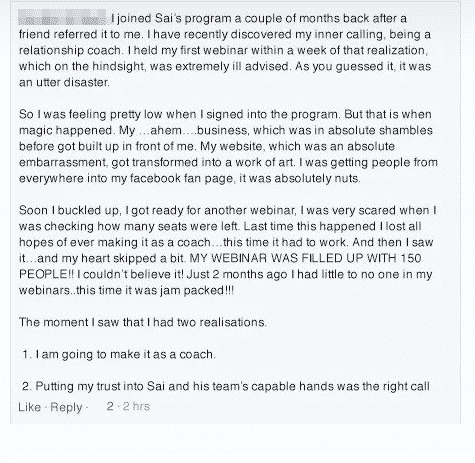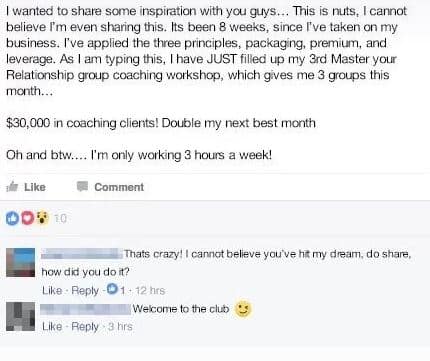Is coaching your true passion or profession? Why not both?
Let me take you through an insider’s journey where you will hopefully learn not only the tips and tricks of the trade but also hear from experienced coaches why they think coaching is an extremely fulfilling vocation.
Coaching is primarily the art of being supportive in the most effective way so that a client overcomes their inhibitions, behavioral roadblocks and masters the skills of jumping over perceived or existing hurdles.
While each person can have a different definition of success, I believe success can be achieved by turning your passion into a profession.
If you are looking at quitting your day job to take up coaching as a full-time career, you need to treat it the same way as any other business. Do your research, understand your market and your own strengths and build your coaching practice on the same lines that you would use to build a successful business.
Can you name some successful coaches you may have heard of or been inspired by? I’m sure you have several.
Did you know what they were doing before they became known and trusted names in the business?
My point is these people were drawn to the world of coaching as it was aligned with their personalities and seemed like a calling. But they also did a good job of treating their calling like a business and investing in it with resources and time. Basically, these are people like you and me who felt that they had the drive to take their business to the next level.
How do you run a successful business?
So how can you become as successful a coach as Christine Whitman or Jack Canfield?
You cannot.
Let me explain.
In today’s world of extremely aware clients, you will need to differentiate yourself by bringing in your unique selling point (USP). You cannot copy what another successful coach is doing or has achieved. Or even try to implement what your competitor is doing at a reduced fee.
Instead, learn from the best in the business, understand their shortcomings and use this knowledge to fill the gap. Bring out the best in yourself so that your client can benefit from the overall package. This will not only ensure client satisfaction but roll back into better references for you and higher revenues on your investment.
I can offer you some help in this regard.
Sign up for my free webinar here and find out what I can do for you.
Business model: Do you need it?
If coaching is your true passion, you are making enough money and have good work references, why bother with drawing up a business model? Perhaps this is your second innings in life and you are hoping to be a coach for as long as you live for there is no retirement for this profession.
Do you still need a business plan and a model?
My answer is yes.
What does a business model do and how can you achieve success with it?
According to a 2002 article in Harvard Business Review, the key governing question for any business while drawing up a business model is: “What is the underlying economic logic that explains how we can deliver value to customers at an appropriate cost?”
In order to understand the principles of a business model, it is important to understand your objectives for creating this business.
Here are some questions that you can think about to streamline your plans:
1. Who is your ideal client and how best can you help him/her? What does your client value most? This will give you an idea of who you want to work with and help you choose a coaching model as discussed in the following segment.
2. How much money is your target: How do you want to achieve it? How many hours of service do you need to provide to make that money? What cost can you afford to meet your targets? These questions will help you draw up a target income and ability to invest in training, travel, and marketing to build and sustain your business.
3. What market are you operating in? This is one of the key differentiators for your business so answer it carefully. Have you done enough research in your preferred market of operation to know what the competition offers? Is there a gap that you can fill? Will your business be scalable within your market of operation?
4. Risk assessment: What are the benefits of your business model? What are the risks involved? How is technology going to impact your business 5 or 10 years down the line? While the truth is that technology is constantly changing and life as you know it may be unrecognizable in 5 years while drawing up a business model and strategy you will have to account for cost and investment in the long term as well. Also, contemplate what your competitor’s priorities are and how that will impact their policymaking.
5. What does your client wishlist look like? While you may need to tweak your expectations and initial list as you go along, it helps to have an initial plan, to begin with.
What is your coaching style?
What is a coaching business model and which should you opt for?
Just as each client personality is different, so too with coaches. And while you are trained to overcome your own challenges before you head out to seek clients, it is important to figure your interest and niche area of expertise for the best possible result.
Some of the popular coaching types are personal (career, finance, health, life, and relationship coaches), religious, wealth, business (sports, executive). And within these wider categories exist niches such as life coach, motivational coach, etc.
Hence what your coaching style will be is entirely dependent on your personality, interest, skills, and opportunities.
4 proven coaching business models
Now that you have worked out the basics of how to create a business, here are some proven coaching business models that you can learn from and adapt towards drawing up your own.
These are independent of any coaching type and you can adapt it to your needs irrespective of whether you are a lifestyle, health, religious or executive coach.
1.One on one private coaching: Interestingly, many coaches start and end with this model. Allow me to elaborate.
Pros: When you are starting on your coaching journey, it is easier to attract work and build your business if you opt for one on one coaching. Besides allowing you to experiment with coaching styles, a private coaching model gives you the relative freedom to choose your clients, working hours and price. The last point is why some very successful coaches opt for private coaching after setting up their business and towards the end of their career. Your time and your skills are the most essential services to be offered in the coaching business. Hence, clients will pay a premium for these once you are an established name in the market.
If you do opt for this model, at any stage in your coaching career, keep time for networking and for actively sourcing clients.
Cons: The main problem is this business model does not allow you to scale up very easily by limiting your income and experience to a single point of interaction. After all, you can only choose so many multiple private coaching clients as you also need some downtime. You cannot work like a machine and burn yourself out at the start of your career.
Summary: While the private coaching model is good for starting (when you are looking to build your brand) or when you have a steady income (and want to pick and choose only a few clients to work with), it is best to look at other coaching models when you want to build your business or take it to the next level.
2. Group coaching: While some coaches opt for this as a natural progression to their coaching journey after their experience of private coaching, group coaching works well for extroverts who feel comfortable enough to interact in large groups, particularly business environments. There are several ways to scale your business in this coaching model, whether it is through a series of sessions, a retreat or workshops. If you are starting, you may not have the budget to arrange an event quite like that but I would advise you to look at your community. If you are an executive coach, why not sell your client the idea of an annual retreat for the company’s employees. A fun event that also packs a punch when it comes to learning and development!
Pros: Well suited for people who thrive in large groups, this coaching model allows you to scale your business up according to your convenience and gives you the ability to get maximum returns for your time. Plus you can price your services differently and customize according to specific needs.
Cons: A personality of a coach (extrovert/introvert) is definitely something to consider while choosing a coaching model. If you are more comfortable starting your coaching journey on a smaller scale, then the prospect of catering to multiple needs at the same time may seem a bit daunting. Large groups also amount to diverse needs and you would need to develop coaching modules keeping these different needs in mind.
Summary: Choose your target audience and coaching model keeping your comfort zone, abilities and experience in mind. Remember that today’s clients will bring in tomorrow’s references, so opt wisely. There is no harm in starting small and scaling up rather than try a do-it-all and incur huge losses.
3. Selling products: Write a book, create an on-demand course or arrange a learning session at a community meeting point – say a library. Harness the advances in technology and create a coaching model that generates income for a longer duration than your average private or group coaching practices. Several coaches including Christine Whitman or Marshall Goldsmith, have written coaching and self-help books that have gone on to become bestsellers, generating a passive income for a longer time.
Pros: First and foremost this model is extremely scalable – you build it and market it and let the momentum grow. Then sit back and enjoy the returns. The work can be upfront (writing a book/creating a module for a course and selling it) but the income thereafter is self-generating and needs lesser efforts to keep running. After the initial workload and the ball has been set rolling, you can simultaneously find time to chase other priorities.
Cons: Unless you are a gifted writer, you will face the same challenges as a first-time author seeking to publish his first book. Not just will you have to overcome editorial challenges, but also find the time and money to ensure that the book is well-edited and designed and marketed in such a way as to stand out among big and experienced names on the racks of a bookstore. This may seem daunting as it requires skills apart from your coaching skills and hence many coaches opt for this coaching model once they are an established name in the business and have a team working to ensure the success of their product.
Also, although a book or workshop has a wider outreach than one-on-one coaching, you will still have to sell your product to multiple groups to earn enough returns on your investment. Also, the investment in marketing needs to be continuously done in order to continue generating returns.
Summary: Opt for this if you believe you have a story to tell and can manage the marketing of your product well. Remember that even a blog or a Facebook page requires a team of social media experts working tirelessly to grab eyeballs. Did you follow the 1000-day journey of Nas Daily on social media? Even a seemingly small team of two hosts traveling the world and creating 1-minute short videos may need a larger working squad of scriptwriters, editors, cameramen, lighting, clothes, and makeup professionals not to mention the admin team that would look after financial, travel and marketing plans. Although the Nas Daily team may not have employed so many people, it is just an indication about the number of members it takes to create content that goes ‘viral’ online.
4. Online coaching: With advances in technology, taking your business online to harness all possible returns seems the most prudent approach if that is the market that appeals to you. An online coaching model, whether through a live session or e-workshop, writing an e-book or creating podcasts provides the flexibility of time with almost zero overhead costs. Look at the success of Bari Tessler, a financial therapist, coach and Mamapreneur and the Founder of The Art of Money who has gained found considerable success after opting to take her business online post the birth of her child.
Pros: The world is your oyster and you have complete flexibility to set your preferences. And since the online world is still growing and developing, you can set up a thriving business if you strategically plan and implement your coaching business model.
Cons: Choosing this model is about being comfortable with catering to people from different continents, across different timezones with varied cultural sensitivities. If you are unsure about using the latest technology, then you may want to choose a different coaching business model.
Summary: There is no right and wrong about choosing a physical, on-ground presence versus an online coaching model. When you are starting, you may want to focus your efforts on winning clients within the local community, if familiarity makes you comfortable. However, if you have been a globe-trotter and are already familiar with working with people from different countries, then choosing this model may be advisable.
A lasting piece of advice that has helped me tremendously in my journey is: Know your market. When you are fully confident about not just your strengths and weaknesses but also those of your competitor’s, you will find new confidence about choosing the coaching business model that works best for you.
No matter what model you choose, remember that you are not bound to any particular coaching model for your business. If profit is what you are looking at, as you rightly should, the one piece of advice I have for you is: Figure out who you are and what you offer best and then specialize in that as a differentiated offering. Because in today’s competitive world, that is the only thing that sells!
You can change your model at any stage as you grow, evolve and learn what works and what doesn’t for you. With age and experience your coaching practice and preferred coaching model can and will change and that is a healthy sign of growth.
Also, don’t feel compelled to chart your success by someone else’s standards. For example, in the beginning, you may opt for group coaching instead of private one-on-one coaching. But over time you may opt for the one-on-one coaching model to establish a better connect with your clients. Or the opposite can happen.
As an introvert, you choose private coaching as a start but soon realize that you are feeling drained and are hindered by the need to implement scalability into your coaching model.
The reality is we should keep learning, growing and experimenting as coaches and even as business owners.
Changing your chosen coaching model is fine as long as you have a clear idea of what you want and where you are headed. That is the route to success.
Importance of good business models
A Harvard Business Review article cites why business models are like stories. “When business models don’t work, it’s because they fail either the narrative test (the story doesn’t make sense) or the numbers test (the profit and loss don’t add up).” The article, though dated, also provides some known examples of companies that worked with constantly evolving business models which led to not just success but a change in mindset and trends in the market. Citing the example of how American Express benefitted from the traveler’s cheque, the author says “…a successful business model represents a better way than the existing alternatives. It may offer more value to a discrete group of customers. Or it may completely replace the old way of doing things and become the standard for the next generation of entrepreneurs to beat.”
Another write-up that cites the reasons why business models fail is by Saul Kaplan here. “Leaders will have to overcome their resistance to exploring new business models even those that may be disruptive to the current one. It’s time to stop admiring the problems and to start exploring business model innovation as the new strategic imperative for all leaders who want to stay relevant in a changing world.”
My journey to success
And now let me tell you about my journey as a way to demonstrate that achieving success is an ongoing process. We may not meet with success right at the start but that is why need to introspect and resurrect our business if need be.
In a previous blog post, I have highlighted why it’s important to find a niche. Working to please everyone and target a large crowd as my clientele, I lost $100,000, and this was years ago! All till I realized that I had something to offer that no one else at that time could think of: targeting a very niche crowd and selling them my services.
Still wondering if I can help you? These are some people who did manage to kickstart their coaching careers with me, so let us see what they have to say:


Do some of these stories sound too good to be true? Believe me when I say your life story has the potential to be just as awe-inspiring when you look back say 10 years from today.
You can access my previous posts about how to build a profitable coaching business and access a free webinar here: https://coachfoundation.com/blog/
So what’s next?
Come check out my webinar and get a headstart into becoming a successful coach.
Frequently Asked Questions (FAQs)
What is a passion coach?
Passion Coaches are experts in helping people find their passion. They work with you and help you uncover your passion by exploring who you are and what makes you tick. The coaches have a proven, step-by-step formula to help anyone identify their passion, pursue it, and achieve the life they’ve always wanted. There are many entrepreneurs, coaches, and business people who have found their passion and are now living the lifestyle they envisioned. Passion Coaches are trained to help you find your passion, start a business, and live the life you’ve always wanted!
Why do you enjoy being a coach?
During my time in the corporate world, I have seen so many people with potential, but without the right guidance, many of them fail to reach their full potential. I started coaching because I strongly believe that if I can help just one person reach his/her full potential, that would be a great achievement. It’s not easy to help someone who is not even ready to accept the help, but it’s rewarding to see that person succeed.
Why is passion important in sports?
Passion is the engine of excellence in any field, be it sports or business or any other activity. When you’re passionate about a certain field, you go above and beyond the ordinary. You put in your best efforts to become the best. And you’re willing to do anything to achieve your goals. If passion were to be rated on a scale of 1 to 10, the average Joe would be at a 5, while an aspiring professional would be at least at a 7. This is why it is important to find what you love doing most and do it well.
Is being a coach a good career?
Being a coach is not as good as earning a salary. But it’s better than being unemployed. It’s just like a part-time job. Sometimes you work a lot, sometimes you work a little. Sometimes you enjoy it a lot, sometimes you are bored. If you can balance your time, being a coach can be a good job.
Can you coach passion?
Yes, you can! I have seen people who have never thought of being a writer go on to become successful freelance writers, and I have seen people who have never thought of being a dancer taking up dance classes and moving on to become professional dancers. This is the magic of passion. With enough passion and desire, you will make things happen. The only thing that can stop you is you.






ABOUT SAI BLACKBYRN
I’m Sai Blackbyrn, better known as “The Coach’s Mentor.” I help Coaches like you establish their business online. My system is simple: close more clients at higher fees. You can take advantage of technology, and use it as a catalyst to grow your coaching business in a matter of weeks; not months, not years. It’s easier than you think.
AS SEEN ON
0 Comment